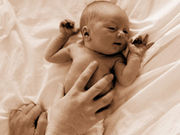But increased risk of poor executive function and visual motor function at age 4.5 years
MONDAY, Aug. 7, 2017 (HealthDay News) — Neonatal hypoglycemia is not associated with increased risk of neurosensory impairment at age 4.5 years, according to a study published online Aug. 7 in JAMA Pediatrics.
Christopher J.D. McKinlay, Ph.D., from the University of Auckland in New Zealand, and colleagues examined whether neurodevelopment at age 4.5 years is associated with the severity and frequency of neonatal hypoglycemia in a prospective cohort study. Participants included 614 neonates born from 32 weeks’ gestation with at least one risk factor for hypoglycemia. For up to seven days after birth, blood and masked interstitial glucose concentrations were measured.
Overall, 477 of the 604 eligible children were assessed. The researchers found observed no increased risk of neurosensory impairment among those exposed to neonatal hypoglycemia (risk difference [RD], 0.01 [95 percent confidence interval (CI), −0.07 to 0.10]; risk ratio [RR], 0.96 [95 percent CI, 0.77 to 1.21]). Hypoglycemia correlated with elevated risk of low executive function (RD, 0.05 [95 percent CI, 0.01 to 0.10]; RR, 2.32; 95 percent CI, 1.17 to 4.59]) and with visual motor function (RD, 0.03 [95 percent CI, 0.01 to 0.06]; RR, 3.67; 95 percent CI, 1.15 to 11.69]). The highest risk was seen for children exposed to severe, recurrent, or clinically undetected hypoglycemia.
“Randomized trials are needed to determine optimal screening and intervention thresholds based on assessment of neurodevelopment at least to school age,” the authors write.
Copyright © 2017 HealthDay. All rights reserved.








